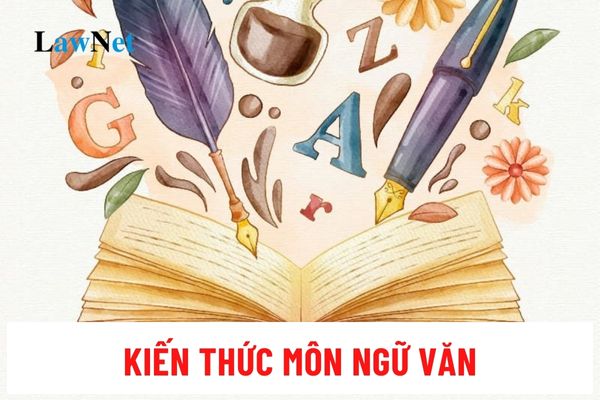All contents of the Literature subject for grade 10 students in Vietnam
Is Literature a mandatory subject of grade 10 students in Vietnam?
In Section 3 of the General Education Program issued in conjunction with Circular 32/2018/TT-BGDDT:
Fundamental Education Stage
...
1.2. Lower Secondary Education
a) Educational content
Compulsory subjects and educational activities: Literature; Mathematics; Foreign Language 1; Civic Education; History and Geography; Natural Sciences; Technology; Informatics; Physical Education; Arts (Music, Fine Arts); Experiential Activities, Vocational Orientation; Local Educational Content.
Elective subjects: Ethnic Minority Languages, Foreign Language 2.
b) Educational Duration
...
2. Career-Oriented Education Stage
2.1. Educational content
Compulsory subjects and educational activities: Literature; Mathematics; Foreign Language 1; History; Physical Education; National Defense and Security Education; Experiential Activities, Vocational Orientation; Local Educational Content.
Elective subjects: Geography, Economic and Legal Education, Physics, Chemistry, Biology, Technology, Informatics, Music, Fine Arts.
Students choose 4 subjects from the elective subjects.
...
ade 10 students will study 6 compulsory subjects, including Literature.

All contents of the Literature subject for grade 10 students in Vietnam (Image from the Internet)
What contents are included in the Literature subject for grade 10 students in Vietnam?
In Subsection 2, Section 5 of the General Education Program for the subject of Literature issued in conjunction with Circular 32/2018/TT-BGDDT, the contents of grade 10 Literature includes:
| VIETNAMESE LANGUAGE KNOWLEDGE
- Errors in word usage and corrections
- Word order errors and corrections
- Rhetorical devices like insertion and enumeration: characteristics and effects
- Errors in paragraph and text cohesion: identification and correction
- Text styles and genres
+ Argumentative texts: purpose, the writer’s viewpoint; organizing and presenting arguments, reasoning, and evidence; narrative and expressive elements in argumentative texts; arguments about a social issue; analysis and evaluation of a literary work; personal reflection essays
+ Informational texts: combination of linguistic means and non-linguistic communication means; combination of expression methods; news reporting and the writer's opinion; comprehensive explanatory texts; regulations and guidance in public places
- Marking ellipses in texts, annotating citations, and footnoting
- Non-linguistic communication means: images, data, charts, diagrams, etc.
LITERARY KNOWLEDGE
- The main inspiration of the work
- The story, third-person narrator (omniscient narrator), first-person narrator (limited narrator), viewpoint in the story
- Some elements of epic and mythological stories: space, time, plot, narrator, character, narrative tone, value and vitality of epics
- The aesthetic value of some formal features in poetry
- Elements of cheo or traditional folk opera scripts: anonymity, themes, plots, characters, dialogue, transmission methods, etc.
- Historical or cultural, and social contexts of the work
- Basic knowledge about Nguyen Trai to aid in understanding some significant works of this author
- Content similarity between literary works from different cultures
- Literary works and readers
MATERIALS
(1) Literary texts
- Myths
- Folk poetry stories, short stories, novels
- Lyric poetry
- Cheo or traditional folk opera scripts
(2) Argumentative texts
- Literary criticism
- Social commentary
(3) Informational texts
- Research reports; explanatory texts incorporating descriptive, narrative, expressive, and argumentative elements
- Regulations, guidance texts || --- |
What is the age of grade 10 students in Vietnam?
Pursuant to Article 33 of the Charter of lower secondary schools, upper secondary schools, and schools with multiple educational levels issued in conjunction with Circular 32/2020/TT-BGDDT prescribing the age of secondary students:
Age of secondary students
1. The entry age for students in Grade 6 is 11 years old. The entry age for students in Grade 10 is 15 years old. Students who skipped grades in the previous educational level or entered the required level older than the stipulated age may have their entry age for Grades 6 and 10 adjusted based on the graduation age of the preceding level.
- Students who are ethnic minorities, students with disabilities, students in especially difficult circumstances, and students returning from abroad may enter the school at an age up to 3 years older than the stipulated age.
- Students are not allowed to be retained in any grade more than 3 times in a single educational level.
...
Based on the above regulations, the most recent age table for each grade is as follows:
|
GRADE |
AGE |
|
Grade 1 |
6 |
|
Grade 2 |
7 |
|
Grade 3 |
8 |
|
Grade 4 |
9 |
|
Grade 5 |
10 |
|
Grade 6 |
11 |
|
Grade 7 |
12 |
|
Grade 8 |
13 |
|
Grade 9 |
14 |
|
Grade 10 |
15 |
|
Grade 11 |
16 |
|
Grade 12 |
17 |
Note: except for cases of grade retention, grade skipping, or students studying at an age higher or lower than the stipulated age.
Thus, grade 10 students are 15 years old.

